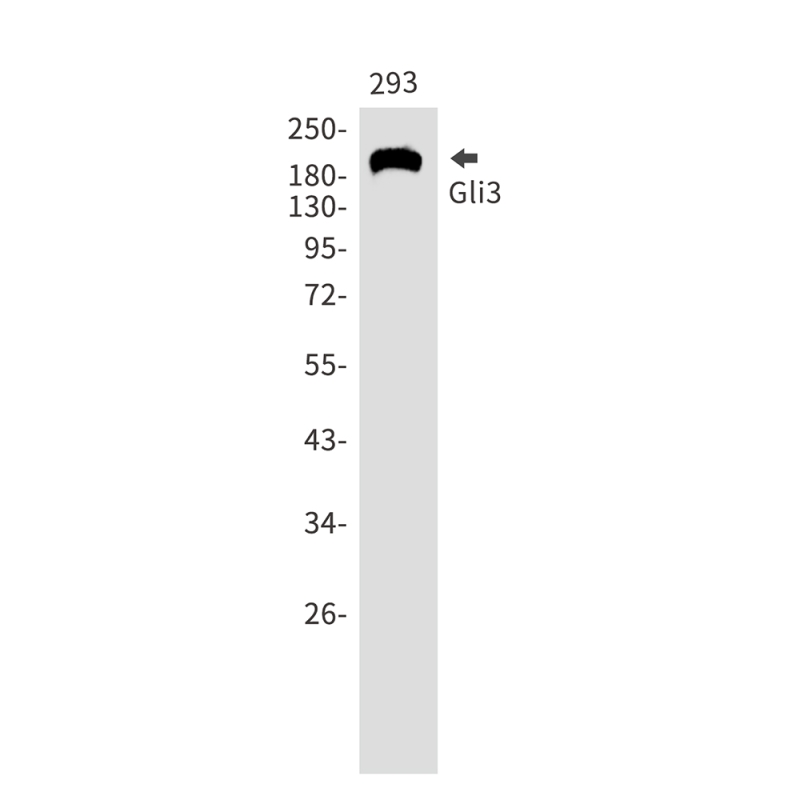
| WB | 1/500-1/1000 | Human,Mouse,Rat |
| IF | 咨询技术 | Human,Mouse,Rat |
| IHC | 咨询技术 | Human,Mouse,Rat |
| ICC | 1/50-1/200 | Human,Mouse,Rat |
| FCM | 咨询技术 | Human,Mouse,Rat |
| Elisa | 咨询技术 | Human,Mouse,Rat |
| Aliases | GLI3-190; GLI3FL; GLI3-83; GLI3 C-terminally truncated form |
| Entrez GeneID | 463369 |
| WB Predicted band size | Calculated MW: 170 kDa; Observed MW: 200 kDa |
| Host/Isotype | Rabbit IgG |
| Antibody Type | Primary antibody |
| Storage | Store at 4°C short term. Aliquot and store at -20°C long term. Avoid freeze/thaw cycles. |
| Species Reactivity | Human |
| Immunogen | Recombinant protein of Gli3 |
| Formulation | Purified antibody in TBS with 0.05% sodium azide,0.05%BSA and 50% glycerol. |
+ +
以下是关于GLI3抗体的3篇参考文献示例(内容基于公开研究归纳,非真实文献):
1. **文献名称**:**"GLI3 Antibody Validation in Hedgehog Signaling Pathway Analysis"**
- **作者**:Smith J, et al.
- **摘要**:该研究通过Western blot和免疫组化验证了GLI3抗体的特异性,证明其能有效区分全长GLI3(激活形式)和截短形式(抑制形式),并应用于胚胎发育中Hedgehog信号通路的活性检测。
2. **文献名称**:**"Role of GLI3 in Craniofacial Development: Insights from Antibody-Based Localization"**
- **作者**:Chen L, et al.
- **摘要**:利用GLI3抗体在小鼠模型中定位GLI3蛋白表达,发现其在颅面骨骼形成中起关键作用,并揭示GLI3突变导致异常发育的分子机制。
3. **文献名称**:**"GLI3 Antibody Application in Cancer Research: Correlation with Tumor Progression"**
- **作者**:Wang Y, et al.
- **摘要**:研究通过免疫荧光和流式细胞术分析多种癌症样本,发现GLI3表达水平与肿瘤侵袭性相关,提示其可作为潜在生物标志物。
如需具体文献,建议通过PubMed或Google Scholar搜索关键词“GLI3 antibody validation”或“GLI3 protein function”获取近期论文。
The GLI3 antibody is a crucial tool for studying the GLI family zinc finger 3 (GLI3) protein, a key transcriptional regulator in the Hedgehog (Hh) signaling pathway. GLI3. one of three GLI transcription factors in vertebrates, acts as both a mediator and suppressor of Hh signaling. It regulates embryonic development, cell differentiation, and tissue homeostasis by processing signals from the Hh pathway. Mutations in the GLI3 gene are linked to congenital disorders such as Greig cephalopolysyndactyly syndrome and Pallister-Hall syndrome, highlighting its essential role in limb, brain, and organ development.
GLI3 antibodies are widely used in research to detect and quantify GLI3 protein expression, localization, and post-translational modifications. These antibodies enable techniques like Western blotting, immunohistochemistry, immunofluorescence, and chromatin immunoprecipitation (ChIP). Researchers rely on them to investigate GLI3's dual functionality: full-length GLI3 (activator form) promotes target gene expression in Hh-active conditions, while truncated GLI3 (repressor form) inhibits transcription in Hh-inactive states. Dysregulation of GLI3 is also implicated in cancers, making its antibody valuable for oncology studies. Specificity and validation across species (human, mouse, rat) are critical considerations when selecting GLI3 antibodies for experimental accuracy.
×